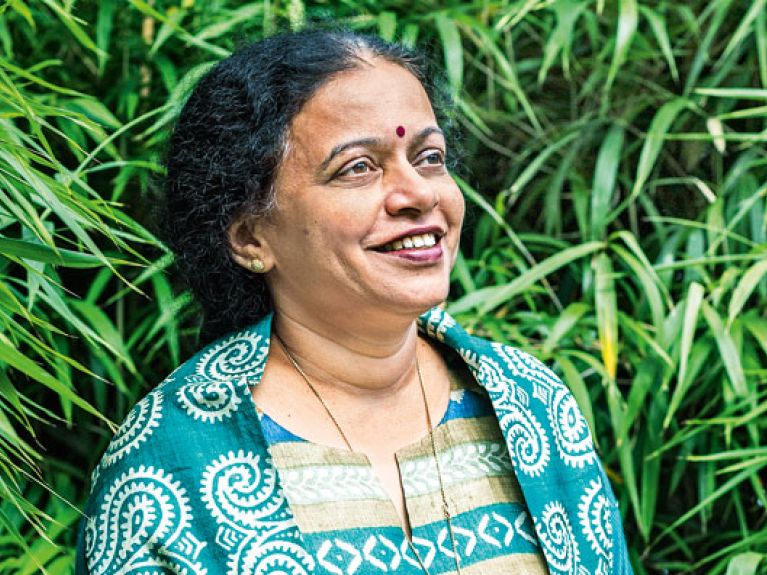“German energy policy is trailblazing”
Leena Srivastava is one of the world’s most influential researchers on energy questions. In an interview she speaks about the German “energy transition”.

Dr. Srivastava, in autumn 2012 and in summer 2013 you spent longer periods of time in Germany as a Richard von Weizsäcker Fellow of the Robert Bosch Foundation. What is your view of Germany’s energy policy?
Germany’s energy policy is indeed transformational – not just for what it is attempting to do for itself but also the opening of minds and opportunities that it is presenting to the rest of the world. Undoubtedly, there will be challenges and barriers to achieving these ambitious goals but similar challenges had to be overcome to reach where we are today in terms of conventional energy. Germany’s energy policy initiatives are opening up new vistas for policy innovations, technological progress, partnerships and research.
The international perception of Germany’s “energy transition” ranges from astonishment to appreciation. How do you rate it?
I would rate Germany’s energy transformation as “inspirational” and “trailblazing”.
According to the World Energy Outlook published by the International Energy Agency, India will be the world’s largest importer of coal by 2020. How can your country master the energy policy challenges it faces?
India needs to urgently move its new infrastructure – energy-producing and energy-using – to renewable energy sources! For this, India has a fairly ambitious programme of expanding its solar programme to put in place 100,000 megawatts of solar capacity by 2027, and this should hopefully create an impetus for much larger private sector participation. India would need at least a 3-4 times larger programme in this time frame to move substantially along the clean energy path. Additionally, it would need to substantially improve the efficiency of its bio-energy production and invest substantially in energy efficiency programmes. Given the scale of India’s energy challenges and the size of the country, the global community must carefully evaluate its own strategy for aggressively supporting India’s energy development – through its own transformative efforts that will drive market creation as well as through requisite capacity creation efforts.
Could the German energy transition become a model for India and/or other countries to follow?
The German experience would definitely be inspirational and would help fast track the thought processes leading to energy transformation. However, I believe that the replications would be simpler for the developed countries that are closer to Germany in terms of capacities and affordability. India may require a longer time frame to follow because of its different starting point on the development path.
You yourself studied economics with a special emphasis on energy at a time when there was very little awareness of environmental protection. How did you come to choose this field?
At the time when I started my career, energy security concerns were very high globally due to the inordinate increases in the price of oil initiated by OPEC. India was already a major importer of crude oil and petroleum products and, being much poorer then than today even in real terms, was extremely vulnerable to global and national energy development. Environmental issues were not well researched nor were there climate change concerns. TERI offered, and continues to offer, an extremely multidisciplinary, systemic and solution-oriented approach to its research which is a very fertile ground for learning. The recognition that energy challenges cannot be addressed without taking on board its environmental, health and other developmental linkages made the research more exciting and rewarding.
Today you are head of one of the world’s most important research institutes for environmental, climate and energy issues. What drives you?
To start with, I am not the head of TERI but part of the senior management team. I am, however, Vice Chancellor of the TERI University, which enjoys a symbiotic relationship with TERI. The association with TERI, and the opportunity to influence policies and programmes at the national and global levels, places a huge responsibility on us at TERI. On the other hand, the opportunity to create a cadre of future sustainability leaders through the TERI University and the responsibility of ensuring that our graduates make the difference that we so urgently need in the world is a great driver to aspire for innovative curricula and pedagogy as well as exciting partnerships with universities and research institutions globally.
“Sustainable development goals” are now set to replace the UN’s MDGs in 2015. You are involved in the consultations. What in your opinion should be at the very top of the agenda?
This is a very difficult question and likely to reflect the biases of the sectors we work in. I would be tempted to say that poverty removal should be at the top of the agenda, but am also aware of the fact that poverty removal would translate into the creation of economic opportunities for the poor. Therefore, and not minimizing the importance of education, health, nutrition, gender and other critically important development issues, I would emphasize the need for providing energy access as core to the creation of economic opportunity and to meeting all other development agendas. Ensuring access to good quality, reliable energy sources through mechanisms that would ensure affordability could be the trigger point for sustainable development
Interview: Martin Orth

